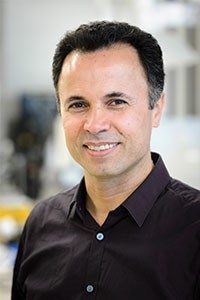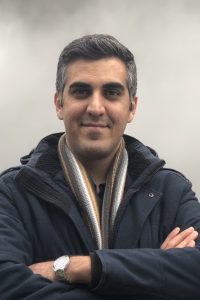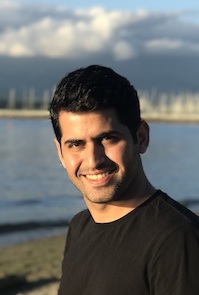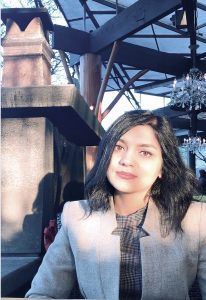MADJID MOHSENI
 Drinking water quality, Advanced Oxidation, UV based water treatment and purification, Ion exchange, Electrochemical water treatment processes, Photocatalysis
Drinking water quality, Advanced Oxidation, UV based water treatment and purification, Ion exchange, Electrochemical water treatment processes, Photocatalysis
Professor
Scientific Director, RES’EAU Centre for Mobilizing Innovation +
Office: CHBE 221
Education
University of Toronto, 1998, Ph.D. Chemical Engineering
University of Toronto, 1994, M.A.Sc. Chemical Engineering
Amirkabir University of Technology, Iran, B.Sc. Chemical Engineering
Research Staff
 Ata Kheyrandish
Ata Kheyrandish
Position:
Laboratory Manager
Postdoctoral Research and Teaching Fellow
Project Manager (RESEAU CMI)
Education:
Ph.D. Chemical and biological engineering, University of British Columbia (2018)
Area of Research: Water and Wastewater Treatment, Potable Water Reuse (PR), Water and Air Disinfection, Advanced Oxidation
Email: ata.kheyrandish@ubc.ca / Website
Ata works as a postdoctoral research fellow at UBC. He has been involved in designing and supervising multiple projects. He is mainly working on evaluating the role of specific free radicals in UV-LED/Chlorine processes to remove a model target pollutant from water. He has also dedicated a part of his research supervising researchers to remove emerging contaminants, such as Per- and polyfluoroalkyl substances from water with novel techniques. Ata graduated from UBC in 2018 with a Ph.D. degree in chemical and biological engineering. He designed and fabricated multiple setups to assess the applicability of ultraviolet light to disinfect water with new UV sources called UV-LEDs. Designing these setup and the systematic approach to evaluating parameters affecting the UV-LED systems, he came up with a protocol, for the first time, to measure and quantify the unique impact of UV-LEDs in water disinfection processes. Moreover, he proposed a guideline to characterize UV-LEDs output, not only for water treatment applications but also for any other application of these UV-LEDs. Position: Mitacs Postdoctoral Fellow, Pani Energy Education: Area of Research: Design, modeling and simulation of VUV/UV based advanced oxidation processes for water and wastewater treatment. Email: m.jafarikojour@ubc.ca Morteza completed his B.Sc (2010), M.Sc (2012) and Ph.D. (April, 2018) in the Chemical engineering department at Amirkabir University of Technology, Iran. He was readily offered entry into a Master's and Doctoral program given his outstanding academic and research performance. He also gained membership of Iran's National Elites Foundation (INEF) in 2015. He completed his M.Sc. program with an emphasis on UV based advanced oxidation processes (AOPs), especially design a new photocatalytic reactor for air purification. His doctoral research centered on application of impinging jet streams in UV/Photocatalyst and Vacuum-UV (VUV) AOPs. In May 2016, He joined Dr. Mohseni’s research group as a part of his Ph.D. program. He worked on a new design impinging jet Vacuum UV reactor during his visiting research at UBC. After completion of his Ph.D., Morteza joined the group again in July 2019 and continued his research as a postdoctoral fellow. His current research involves design, CFD simulation and scale up of UV/VUV reactors for water treatment. He is also working on the kinetics of the VUV/UV AOPs for water treatment. He has experience of developing various reactor systems in water, wastewater and air treatment and advising graduate and undergraduate projects in this field. 
Morteza Jafarikojour
Ph.D. Amirkabir University of Technology, Tehran, Iran.
M.Sc. Amirkabir University of Technology, Tehran, Iran.
B.Sc. Amirkabir University of Technology, Tehran, Iran.
 Leili Abkar
Leili Abkar
Position: Postdoctoral fellow
Education:
Ph.D., Civil Engineering, Dalhousie University
MSc., Chemical Engineering, New Mexico State University
MSc., Biotechnology, Iran University of Science Technology
BSc., Chemical Engineering, Tehran Polytechnic
Area of Research: Water treatment, membrane desalination processes, drinking water biofiltration, airborne pathogen inactivation using UV, applied environmental biotechnology
Email: l.abkar@ubc.ca
Leili Abkar is a Postdoctoral Fellow at SWIRL, Chemical and Biological Engineering at the University of British Columbia, Canada. Her postdoctoral project focuses on the inactivation of SARS-Cov-2 in the air using Ultraviolet lights. In her Ph.D., she investigated the biological root causes of performance challenges of drinking water biofiltration at macro and micro-scale, integrating operational parameters and microbiome data. During her Ph.D. degree, she won the Nova Scotia Graduate Scholarship for four consecutive years and the Faculty of Engineering Excellence Award. Previous to her Ph.D., she obtained two master’s degrees, one at the Iran University of Science and Technology in Iran and another at New Mexico State University in the USA. She advanced her knowledge in biotechnology and researched the biological removal of para-nitrophenol from wastewater and optimizing reverse osmosis desalination. Her industry experience includes working with different desalination technologies with a startup company wining and executing a national project of localizing desalination technologies in Iran.
Doctoral Students
 Fuhar Dixit
Fuhar Dixit
Position: Ph.D. Candidate and Vanier Research Scholar
Education:
M.A.Sc., Chemical and Biological Engineering, University of British Columbia (2017)
B.Tech., Ceramic Engineering, Indian Institute of Technology, Banaras Hindu University, Varanasi (2014)
Awards/Honours:
Natural Science and Engineering Research Council of Canada (NSERC) Vanier Scholar, NSERC Michael Smith Fellow, The Power of Youth Leadership Award (Drishti Media Group), Mitacs Globalink Fellow, Honda YES Fellow
Area of Research: Per and polyfluoroalkyl substances (PFAS) removal from drinking and reuse waters.
Email: Fuhar@mail.ubc.ca
Fuhar is currently a PhD candidate and a Vanier Scholar at UBC investigating practical solutions to address the global challenge of drinking water scarcity. In particular, his research focuses on the application of low-cost treatment technologies for the removal of physical, chemical, and microbial contaminants from municipal waste-water to ultimately improve the efficacy of its reuse. Fuhar has been an active member of the ‘IC-IMPACTS Student Engagement Committee (SEC)’ since its inception in 2015. In this role, he coordinated and implemented many SEC-related activities for training high quality professionals (HQPs) in both Canada and India. In addition to his research contributions towards the field of environmental conservation, Fuhar strives towards the protection of wildlife and natural resources. He is also an active playing member of the ‘INDCAN Cricket Club’ and competes in national level badminton tournaments as a member of the 'Vancouver Racquets Club'.
Fatima Alafifi
Position: Ph.D. Candidate
Education:
M.Res. Computational Methods in Ecology and Evolution, Imperial College London
B.Sc. Chemical Engineering, Texas A&M University
Awards/Honours:
Member of Tau Beta Pi Honor Engineering Chapter
Member of Omega Chi Epsilon Honor Society
Awarded the QSLP scholarship
Area of Research: Advanced Oxidation Processes for Microcystins Removal
Email: falfifi@mail.ubc.ca
Fatima received her B.Sc degree in Chemical Engineering with minor in Chemistry from Texas A&M University in Qatar. Her passion towards chemical engineering and computational sciences lead her to pursue her master’s in research (M.Res) in Computational Methods in Ecology and Evolution at Imperial College London in the UK. Her Ph.D. focuses on applications of advanced oxidation processes (AOPs) for drinking water treatment. Fatima is studying the degradation of MC-LR toxins using ozonation in adjunct with Vacuum UV. In her experiments she studies different water matrices that resemble Qatar’s seawater. This research will help implement more efficient drinking water treatment processes in Qatar.
 Ehsan Banayan Esfahani
Ehsan Banayan Esfahani
Position: Ph.D. candidate (fulfilled candidacy in 2021)
Education:
M.Sc. Chemical Engineering, Sharif University of Technology, Iran
B.Sc. Chemical Engineering, Sharif University of Technology, Iran
Awards/Honours:
1st place presentation in 2019 WEST conference, Philip H. Jones Award
Runner up in Graduate Short Research Presentation in 2021 CHBE Conference
Sharif University of Technology Association (SUTA) Grant
Member of Iran’s National Elites Foundation
Area of Research: UV-based advanced oxidation/reduction processes, PFAS Treatment
Email: ebanayan@mail.ubc.ca
Ehsan received his Bachelor's degree in Chemical Engineering from Sharif University of Technology (SUT), Iran (2009-2013). In B.Sc., he mainly focused on industrial wastewater treatment using membrane bioreactor. Subsequently, Ehsan continued his study as a master student in environmental engineering group of SUT and worked on biological nutrient removal from municipal wastewater in Biochemical and Bioenvironmental Engineering Research Center (BBRC). His outstanding academic performance provided him the opportunity to acquire the membership of Iran’s National Elite Foundation. In May 2018, Ehsan joined the Advanced Oxidation Processes research group at the University of British Columbia. As a PhD student, his research focuses on photo-degradation of perfluorinated compounds (PFCs) using vacuum ultraviolet (VUV) irradiation. PFCs are notorious to be bioaccumulative and environmentally persistent and have multiple toxic effects such as immunotoxicity and carcinogenicity. Ehsan’s work will use the high energy photons of VUV spectrum to mineralize PFCs.

Mahboubeh (Shohre) Mirzaei
Position: Ph.D. candidate
Education:
M.Sc. Chemical Engineering, Amirkabir University of Technology, Iran (2016)
B.Sc. Chemical Engineering, Amirkabir University of Technology, Iran (2014)
Area of Research: UV-based Advanced Oxidation/ Reduction Processes (UV-AO/RPs) – Per- or Poly Fluoroalkyl Substances (PFAS) Treatment
Email: Mahboubeh.mirzaei@ubc.ca
Mahboubeh (Shohre) completed her B. Sc. (2014) in Chemical Engineering at the Amirkabir University of Technology (AUT), Iran. Given her outstanding academic and research performance, she was readily offered entry into a M. Sc. program at AUT. For her Master thesis, she worked on design and application of a spinning disc photoreactor for wastewater treatment. She mainly focused on analysis and mathematical modeling of the interactions between the transport processes and chemical reactions in the designed reactor. Later, she joined the SWIRL team at the University of British Columbia in September 2018 for her Ph.D. Her current research is on degradation of per- or poly- fluoroalkyl substances (PFAS) in concentrated waste streams. In particular, she is working on application of UV- based Advanced Oxidation/ Reduction processes (UV- AO/RPs) for PFAS decomposition.
 Karl Zimmermann
Karl Zimmermann
Position: Ph.D. Candidate (program start: Sept 2018)
Education: B.Eng in Chemical Engineering specialization in Bioscience, Coop, McMaster University (2018)
Awards/Honours:
NSERC Vanier Scholar (2020), CGS-Master’s (2018), UBC finalist: Three-Minute Thesis (2019), Chair Water and Environment Student Talks (WEST) Conference (2021), founding Co-chair WESTalks global water seminar series (2020-21), President UBC BCWWA Student Chapter (2020-21), founding President of UBC Future Waters Student Executive (2020-21)
Area of Research: Biological ion exchange for the removal of natural organic matter during drinking water treatment of surface waters.
Email: karl.zimmermann@ubc.ca
Karl is a PhD candidate and NSERC Vanier Scholar in the department of Chemical and Biological Engineering at the University of British Columbia, Vancouver Canada. His research entails biological ion exchange to understand these low-maintenance drinking water filters for removing natural organic matter from surface waters. Karl received his Bachelor’s in chemical engineering from McMaster University with an undergrad thesis on polymer flocculation for acid mine drainage tailings dewatering. Inspired by SDG 6 and the human right to safe water and sanitation, Karl is interested in improving the translation of research innovation into locally-adapted water solutions that can be used in developing communities around the World. Karl is also involved with RES’EAU Centre for Mobilizing Innovation, where he is helping to implement drinking water treatment solutions in small First Nations communities in BC. When not in school, Karl is often found logging miles on the Fraser River with the UBC varsity rowing team. Rowing has been a passion since starting his undergrad, and which has shown the importance of clean water for health and the enjoyment of life.

Mahsa Masjoudi
Position: Ph.D. Candidate
Education:
M.Sc. Chemical Engineering, Sharif University of Technology, Iran
B.Sc. Chemical Engineering, Sharif University of Technology, Iran
Area of Research: UV-based advanced oxidation processes, water treatment and reuse
Email: masjoudi@mail.ubc.ca / Website
Mahsa completed her Bachelor’s (2017) and Master’s (2019) degrees in Chemical Engineering at the Sharif University of Technology in Iran. She became interested in Environmental Engineering during her undergraduate research project where she focused on the use of natural adsorbents for removal of dyes from water. Later, she ranked in the top 10 students admitted to the Master’s program in Environmental Engineering at the Sharif University of Technology. For her Master’s thesis, Mahsa worked on degradation of pharmaceutical contaminants by immobilized enzyme on nanocomposite membranes. Right after fulfilling her M.Sc degree in Iran, Mahsa joined the SWIRL team at the University of British Columbia in September 2019 to continue her studies as a Ph.D. student. Currently, her research is centered around the development and application of UV-based advanced oxidation processes, VUV/UV/free chlorine in particular, for the removal of micropollutants in water reuse applications.
Simeng Li
Position: Ph.D. student
Education: B.A.Sc. Chemical & Biological Engineering, University of British Columbia (2021)
Email: simengli@student.ubc.ca
Simeng is a first year Ph.D. student in Chemical & Biological Engineering at the University of British Columbia. Her previous research focused on evaluating the contribution of bacteria in biological ion exchange (BIEX) resins on DOC removal and predicting DOC removal performance of BIEX.

Fatemeh Asadi Zeidabadi
Position: Ph.D. student
Education:
M.A.Sc, Chemical Engineering, Sharif University of Technology (SUT) (2017)
B.A.Sc, Chemical Engineering, Sharif University of Technology (SUT) (2014)
Awards/Honours:
Sharif University of Technology Association (SUTA) student grant
Member of SUT exceptional talents
Area of research: Electrochemical oxidation processes, Per- or polyfluoroalkyl substances (PFAS) treatment
Email: fasadi@mail.ubc.ca
Fatemeh received her bachelor’s and master’s degrees in Chemical Engineering from Sharif University of Technology (SUT) in 2014 and 2017, respectively. During bachelor’s study, she mainly focused on Bisphenol-A removal from water using polymeric membrane. She was offered entry into a Master's program given her outstanding academic and research performance. She also gained membership of SUT exceptional talents in 2014. In her master’s program, she involved in an environmental project working on the preparation of polymeric membrane for industrial wastewater treatment besides her main project focusing on transfer phenomena and separation processes. Her experience and passion in the water treatment field led her to join SWIRL group. Currently, her research is focused on the electrochemical oxidation of per- or polyfluoroalkyl substances (PFAS).
Master’s Students

Jaycee Wright
Position: M.A.Sc. student
Education: B.A.Sc. Chemical Engineering, University of British Columbia (2019)
Awards/Honours:
NSERC Undergraduate Student Research Award
Trek Excellence Scholarship for Con’t Indigenous Students of Canada
Area of Research: Biological ion exchange for drinking water treatment in small communities
Email: wrightj@mail.ubc.ca
Jaycee completed her bachelor’s degree in Chemical Engineering at the University of British Columbia in 2019. Their interest in environmental sustainability and water treatment led her to join Dr. Mohseni, his water research group SWIRL, and RES’EAU WaterNET after graduation. For their graduate studies, Jaycee was drawn to biological ion exchange (BIEX), a technology focused on removing natural organic matter from drinking water, with a focus on small communities. She is running a pilot project with RESEAU CMI and the community of Gillies Bay Improvement District, with the aim of learning how BIEX treatment can be implemented in the field to bring clean drinking water to small and Indigenous communities in Canada. When not at school, Jaycee enjoys exploring the great outdoors by skiing, hiking, and canoeing in their homemade cedar strip canoe, and knitting when it’s time to be cozy inside.
Michael Johnson
Position: M.A.Sc. student
Education: B.A.Sc., Nanotechnology Engineering, University of Waterloo, Canada (2020)
Area of research: Ion exchange and nanotechnologies for PFAS removal
Email: mr2johns@mail.ubc.ca
Michael completed his bachelor's degree in Nanotechnology Engineering at the University of Waterloo in 2020. His interest in environmental issues and water remediation was sparked by his co-op placements at H2NanO and Environment and Climate Change Canada, where he worked to develop methods of removing naphthenic acids from Alberta tailings ponds, and general oil spill cleanup tools respectively. This with his drive to learn culminated in his application to graduate studies in Chemical and Biological Engineering at UBC, and grateful acceptance to Dr. Mohseni’s research group. For his research project he is applying his experience with nano materials and technologies to the field of potable reuse and the removal of per- and polyfluoronalkyl substances from drinking water. When not at school Michael enjoys hiking, cycling, and collecting what some may consider too many plants.
William Szu-Wei Chen
Position: M.A.Sc. student
Education: B. Eng, Chemical Engineering, McGill University, Canada (2016)
Awards/Honours: British Columbia Graduate Scholarship
Area of research: Optimization of biological ion exchange for NOM removal
Email: wschen@mail.ubc.ca
William received a bachelors degree in Chemical Engineering from McGill University (2016), during which he completed co-op terms in the Alberta oil and gas sector and researched gas hydrate stability and modelling under the supervision of Dr. Phillip Servio. His transition to environmental applications of chemical engineering began when he joined an environmental consulting firm in Langley, BC, conducting contaminated sites assessment and remediation primarily for clients in the retail fuel sector. After nearly four years in the industry, William sought to return to school for graduate studies and was gratefully accepted into Dr. Mohseni’s research group at UBC, where he hopes to bring his professional experience to the table in advancing novel water treatment technologies to solve real-world issues. William is investigating opportunities for process optimization of biological ion exchange in the removal of natural organic matter (NOM) for drinking water treatment. His research aims to support the application of this technology to remote and small communities, particularly those in Canada which still do not have reliable access to clean drinking water.
Alumni (Past 5 Years)
Maryam Dezfoolian (2020)
- Innovations in natural organic matter removal using ion exchange
Engineer at HDR Inc., Vancouver, B.C.
Mengqi (Maggie) Han (2020)
- Impact of water solutes on the formation of nitrite under Vacuum UV(VUV) advanced oxidation of nitrate-rich water
Adrian Alberto Serrano Mora (2020)
- Stability and electrochemical regeneration of activated carbon electrodes for capacitive deionization
Assistant Professor at Universidad de Costa Rica, Costa Rica.
Emily Froese, M.A.Sc. (2019)
- Removal of natural organic matter for drinking water treatment using electrocoagulation and ultrafiltration.
Process Engineer at MWH Treatment, United Kingdom.
Siddharth Bhartia, M.A.Sc. (2018)
- Biological stability for vacuum UV advanced oxidation treatment of surface water
Water Wastewater Engineer - AWC Water Solutions Ltd., Vancouver.
Chung, Ting-Chih, M.A.Sc. (2018)
- Evaluating the desalination performance and efficiency of capacitive deionization with activated carbon electrodes
Program Specialist at Mitacs, Vancouver, BC
Kai Song, Ph.D. (2018)
- Application of ultraviolet light-emitting diodes (UV-LEDs) for water disinfection by multiple wavelengths and pulsed irradiation.
Nanjing Forestry University, China
Laith Furatian, Ph.D. (2017)
- The use of 185 nm radiation for drinking water treatment.
Water treatment specialist at Stantec.
Pranav Chintalapati, M.A.Sc. (2017)
- Degradation of cyanobacterial toxin microcystin-LR using UV/vacuum-UV advanced oxidation for drinking water treatment.
Ph.D. Student at University of Colorado, Boulder, CO.
Reza Rezaei, Ph.D. (2017)
- The impact of natural organic matter (NOM) on photocatalytic process for the degradation of micropollutants.
Co-Founder and CEO at Aqua Intelligent Technology, Vancouver, BC
Sean McBeath, M.A.Sc. (2017)
- Pilot capacity iron electrocoagulation scale-up for natural organic matter removal for drinking water treatment.
Postdoctoral fellow, California Institute of Technology (Caltech), USA
Mohammad Mahdi Bazri, Ph.D. (2016)
- Kinetics and fate of natural organic matter under different water matrices using strong basic ion exchange resins.
Project Manager - Water Engineer at Jacobs, Vancouver BC
Mohammad Umar, Postdoctoral Researcher (2016)
Research Scientist, Norwegian Institute for Water Research